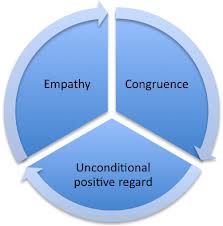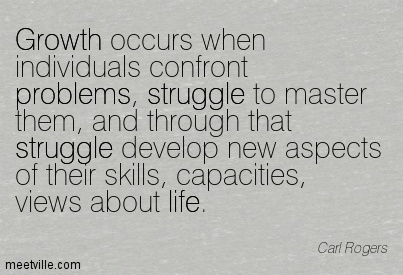In this month’s blog post I wanted to talk about the person centred approach to counselling.
I offer this type of counselling because it aligns with my own views on human beings. I believe that we want the best for ourselves and I  trust we have all the resources we need to do this, if only we can free ourselves of the things which are blocking our growth.
trust we have all the resources we need to do this, if only we can free ourselves of the things which are blocking our growth.
How we see ourselves plays a huge part. Part of that comes from what we imagine others think of us and from our need to be approved of. So as children, if we were lucky enough to grow up in an environment where we were loved and prized for who we were and not what others wanted us to be, we would be better able to keep in touch with what we think and feel rather than trying to live up to the values and beliefs of others. However the reality is that to a lesser or greater degree, we all end up on the receiving end of beliefs and values of parents, teachers and wider society and so we adapt to the messages which say ‘you are worthy if you………………..’ So who we really are becomes buried and in its place we have a self-concept which includes the messages about how to maintain the approval of others. The point at which we seek counselling is often the stage where the conflict between our experience, which may have been denied or distorted, and who we think we are becomes too great and we want change.
So when you arrive for counselling, you can expect to develop a relationship with your counsellor which is rich in three conditions – empathy, unconditional positive regard and congruence and I will describe these briefly below.
Simply put, empathy is stepping into your shoes and trying to see the world as you see with all your meanings and beliefs. Unconditional positive regard is about accepting you as a unique individual of worth. Congruence is also known as transparency or genuineness. Empathy and unconditional positive regard need to perceived by you and they should be offered to you genuinely and not as a tool. It would be no good if you felt you were offered conditions in a way which didn’t feel authentic.
Some have criticised the approach for its individualist outlook which can be viewed as selfish, but the argument is that when we experience these three conditions, we are inclined to move in a pro-social direction which ultimately benefits all.
So to finish, person centred counselling aims to help you unblock whatever is getting in your way and free you for growth and development. The aim isn’t to ‘do’ something to you but instead to support you in your exploration. Person centred counselling doesn’t seek to impose anything on you. It is like entering into a bubble for 50 minutes each week where the focus is on you and what you wish to explore. If the relationship between you and your counsellor feels safe, hopefully you won’t feel threated and that can help you to open up and explore aspects of yourself or your experiencing which may have been difficult to talk about previously. As a result, you will likely gain greater understanding of yourself and acceptance and this may help you to find your own way forward.

